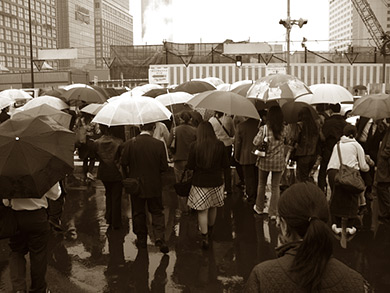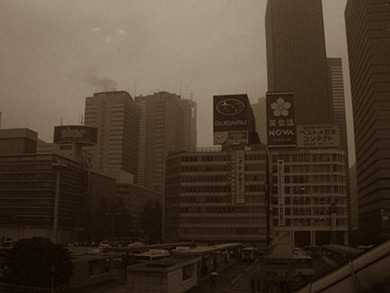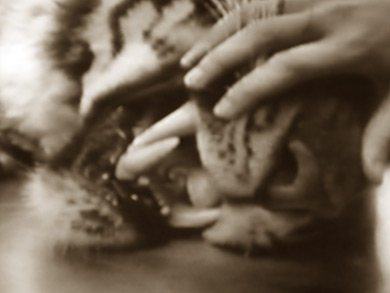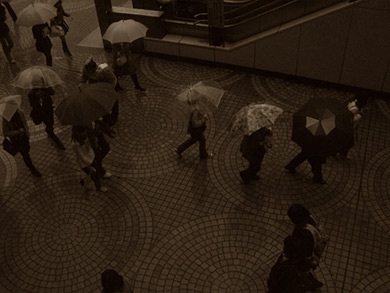'Art aside, Art Basel Miami is all about seeing and being seen, spending time with old friends and new friends and networking like crazy...'
'Even as we seek to have a sense of orientation which will allow us to protect ourselves, we also perceive, often in retrospect, various forms of danger.'
'The world never offers you anything other than the temptation to yield.'
'Most days there's a lot of laughter in our gallery, and it often surrounds the perversion of the art system and our part within it.'
'We can say that this destiny of marginality has now come to an end. The Multitude, rather than constituting a 'natural' ante-fact, presents itself as a historical result, a mature arrival point of the transformations that have taken place within the productive process and the forms of life. The 'Many' are erupting onto the scene, and they stand there as absolute protagonists while the crisis of the society of Work is being played out. Post-Fordist social cooperation, in eliminating the frontier between production time and personal time, not to mention the distinction between professional qualities and political aptitudes, creates a new species, which makes the old dichotomies of 'public/private' and 'collective/individual' sound farcical. Neither 'producers' nor 'citizens', the modern virtuosi attain at last the rank of Multitude.'
'Hardt and Negri [on 'Multitude'] are often uncritical and credulous in the face of orthodox propaganda about globalization and immateriality ... They assert that 'immaterial labour' - service work, basically - now prevails over the old-fashioned material kind, but they don't cite any statistics: you'd never expect that far more Americans are truck-drivers than are computer professionals. Nor would you have much of an inkling that three billion of us, half the earth's population, live in the rural Third World, where the major occupation remains tilling the soil.'
'The protocols of representative legitimisation attempt to render continuous what is not, to give disparate sequences a unique name, such as the 'great proletarian leader' or the 'great founder of artistic modernity', names that are actually borrowed from fictional objectivities.'
A question is posed in the contradictions of an antagonism between 'belonging', and 'conforming': to the mechanics of conformity that uphold the opposition friend / enemy, to ambivalence in solutions inscribed in the attempted tactic to move through the threshold of an opposition: resistant 'refusal' (dread to accommodating 'acceptance' (refuge).
The once 'marginal' China Art Objects Galleries in Chinatown, Los Angeles, predicated 'refuge' by accepting the Basel Art Fair's prestigious award (Best Booth) - as Chris Kraus had also written in eulogistic prose for the work of the late Giovanni Intra, its founder -whilst at the same time, as an agent of gentrification and leader of the 'bohemian fringe', pushing the real estate value of a poor area through the floodgates of its artist / tourist occupation toward 'regeneration'. China Objects Galleries failed both in subjective and objective force, by not conceding to the void at the heart of things. Intra's precocious yet intellectually and artistically ambitious practice would nevertheless bring a generation of cynical strategies into play. L.A subculture, as exemplified by its appropriation of unhealthy forms of surrealism, situationism and punk, once prescribed a dose of disorder into the local art scene's protocols of representative legitimisation yet incited, by proxy, to transport 'a sense of place' (Chinatown) by sublimation to the un-real estate of the art world. Do all good things arrive at this non-road? Any exit from the art traffic in desire (for autonomy) is better taken in indifference to the double-edged sword of 'belonging' (being safe) imposed by the 'dread / refuge' coupling.
As the work / leisure dynamic plays out in the markets of art, the possibility of a new generic form of angst is being hijacked into (global) aesthetic models, legislated by the multiform of 'disobedient' art fairs, 'off the map' biennales, 'political' symposia, 'social' interventions, 'net' art, the rise of the 'artist-curator', the 'culture-preneur', the neo-conservative 'new gallerist' etcetera. Does this not precisely mark Intra's acceptance as model for the turn to constitute the majority, at a deeper and comic level of sophist argument for postmodernism, in our complicity?
'Most days there's a lot of laughter in our gallery, and it often surrounds the perversion of the art system and our part within it.'
Or, in other words, everything is 'permitted' from the outside (excepting the uncanny, the 'exception' of the void) by an unspoken edict, an injunction to art's antagonistic contradictions; what is or not made and done, may be accorded its non-antagonistic contradiction, only as far as a 'visibility' can be gained from visuality. Art's pluralities, aesthetic transformations, technological bifurcations and virtual simulations might instead imply a radical in-difference, or an uncanny separation within, universally reproducible as the exception, in singular, oblique moments.
As a new aesthetic 'at home' in discontinuity, the 'swarm' effect of Multitude tests the subversive capability of networks' anonymity 'deep inside' the inside. The governmental 'home' of the Multitude aesthetic is therefore, twofold, the same: 'everywhere' specific, discontinuous, in bio-political acts of revolt, and at the same time invisible, emerging / sinking uncannily 'elsewhere' unpredicated as art, not in contradiction to / by negation of, but cut away, in separation from its arterial body. Something like Lacan's 'There where I think, I am not, and there where I am, I do not think'. Multitude should not be confused with the consensual ethics of 'majority'. The singular, or (perhaps) the few, is in fact Many, able to subtract consensus from its 'ethical', throwing out the baby to keep the dirty water.
In the rupture of obedience to and disobedience from the market's mechanisms, from which unity of opposition the art world accumulates value, projected and authorised through the public / private, collective / individual sphere, is Multitude to be aroused from slumber in a call to arms? Is it not that the call to arms has 'always-already' arrived in the discomfiting of all affective pedagogy, returning as phantom, a 'Handbook for Disobedience'?
'My name is Nobody...'
'[of] Epicurus and Lucretius, for whom the void is the first name of the heterogeneously existent, splendidly indifferent both to subjects and to gods.'





